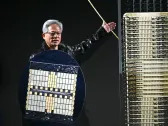In a groundbreaking keynote at CES 2025, Nvidia CEO Jensen Huang unveiled the next generation of RTX Blackwell GPUs and declared the rise of "Agentic AI" – a shift that promises to create a multi-trillion-dollar industry and redefine how people work.
The Dawn of Agentic AI
Huang described Agentic AI as a new era in artificial intelligence, one that moves beyond generative AI’s focus on creativity and automation. In the age of Agentic AI, intelligent agents will drive tasks across industries, freeing humans to focus on higher-level decision-making and creative problem-solving.
"This is the age of AI Agentics," Huang exclaimed, positioning Nvidia at the forefront of this emerging sector. "We’re not just talking about a multi-billion-dollar industry – we’re talking about a multi-trillion-dollar opportunity."
RTX Blackwell: The Next Generation of GPUs
The highlight of Nvidia’s keynote was the unveiling of the RTX Blackwell family of GPUs, which promises to deliver groundbreaking performance improvements at lower prices. The GeForce RTX 5070, for example, matches the performance of the previous generation’s RTX 4090 but costs just $549 – far less than the 4090’s launch price.
"This is impossible without artificial intelligence," Huang said, attributing the price-performance breakthrough to AI-driven efficiencies.
RTX Blackwell Series: Key Product Announcements
- RTX 5070: Offers the performance of the RTX 4090 at $549, undercutting the previous generation’s high-end price.
- RTX 5070 Ti: Delivers 4090-like performance at $749, featuring 1,406 AI TOPS and 16GB of G7 memory.
- RTX 5090: The top-tier model with 3,404 AI TOPS and 32GB of G7 memory, retailing for $1,999.
- RTX 5080: Mid-range option with 1,800 AI TOPS and 16GB of G7 memory.
Project Digits: Brining AI Supercomputing to the Masses
Huang also announced Project Digits, a platform that brings Nvidia’s AI supercomputing capabilities directly to developers’ desktops. Powered by the GB10 Grace Blackwell Superchip, Project Digits offers a petaflop of AI computing performance for prototyping, fine-tuning, and running large AI models.
Cosmos: Advancing Physical AI
Nvidia’s push into autonomous machines also took center stage as Huang unveiled "Cosmos," a new foundation model designed to advance physical AI. Cosmos generates synthetic data to train AI systems, accelerating their ability to navigate and adapt to real-world environments.
Huang announced a partnership with Toyota to integrate Nvidia’s AI systems into the automaker’s autonomous vehicle development.
"A trillion miles that are driven around the world each year, that’s all going to be either highly or fully autonomous," Huang said. "I predict that this will likely be the first multi-trillion-dollar robotics industry."
The Future of Work: Agentic AI and the Digital Workforce
Huang described Agentic AI as a shift in how we work, with intelligent agents handling workflows, problem-solving, and providing real-time support across industries.
"The IT department of every company is going to be the HR department of AI agents in the future," he said.


